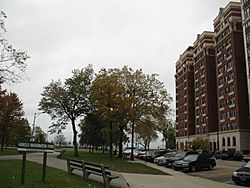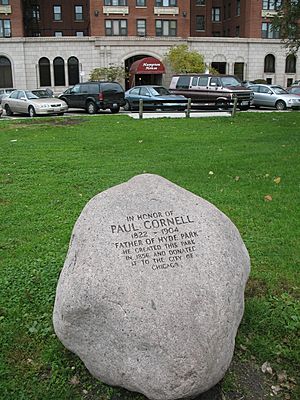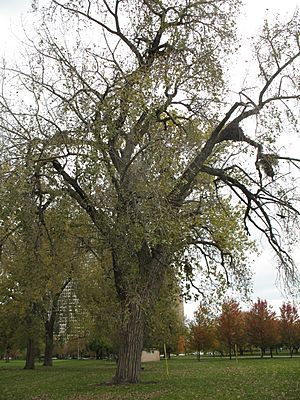Harold Washington Park facts for kids
Quick facts for kids Harold Washington Park |
|
|---|---|

Harold Washington Park and Hampton House, October 2006
|
|
| Type | Municipal |
| Location | Chicago, Cook County, Illinois |
| Operated by | Chicago Park District |
| Status | Open all year |
Harold Washington Park is a small park in Chicago, Illinois. It's about 10 acres big and is located in the Hyde Park area on Chicago's South Side. The park is named after Harold Washington (1922–1987), who was a lawyer, state legislator, U.S. congressman, and the first African American Mayor of Chicago. He also lived in Hyde Park.
The official name for the park is Harold Washington Playlot Park. Its address is 5200 S. Hyde Park Blvd, Chicago, IL 60615. This park is one of four parks in the Chicago Park District named after people with the last name Washington. It's also one of 40 Chicago Park District parks named after important African Americans. The park is bordered by East 53rd Street to the south, South Hyde Park Boulevard to the west, and Lake Shore Drive to the east. Nearby buildings include Regents Park to the north and The Hampton House to the south. Also, two historic buildings, Hotel Del Prado and East Park Towers, are across from its southwest corner.
Park History

The land for this park was given to the city in 1906 by Paul Cornell. There's a special stone, called the Paul Cornell Stone, that remembers this gift. When it first opened, the park was called East End Park.
In 1919, the park was moved under the care of the South Park Commission. Then, in 1927, it became part of Burnham Park. The park district officially renamed the site Harold Washington Park in 1992. Before that, around 2004, many local people still called it Cornell Park.
Park Facilities
Harold Washington Park is a favorite spot for people in the neighborhood to have picnics, especially during summer holidays like Memorial Day, July 4, and Labor Day.
The park has many things to do:
- 8 tennis courts for playing games.
- A fun playground with a soft surface for kids.
- A bathhouse.
- A boat pond.
The park is also famous for its monk parakeet nests, which are birds from South America. At 51st Street, there's a bridge that goes from the park to a bike path located between Lake Shore Drive and Lake Michigan.
The Boat Pond
Many local people mistakenly call the boat pond a "duck pond." This is because ducks often visit it in the summer, even though it's rarely used for model boats. The pond doesn't have plants or aquatic life to support ducks. In 2006, the pond was closed for repairs and wasn't filled with water. Reconstruction started in the fall, and the pool's surface was redone. A fountain and sculpture were added in the center in the spring of 2007, and the pond was refilled in late summer 2008.
Monk Parakeet Nests
In the 1980s, about a dozen monk parakeets from South America were set free in the park. They made their home in a large ash tree across from the Hampton House. By the summer of 1988, bird watchers counted two dozen birds in that tree. The number of parakeets kept growing quickly.
This group of birds is known to many as "Harold's parakeets." The flock has grown to a few hundred birds that now nest throughout Harold Washington Park, and also in Burnham Park and Jackson Park on the South Side of Chicago.
The original ash tree where the parakeets lived became infested with termites and fell down on June 12, 2004. More than 50 birds lost their homes. Luckily, new nests were built in other trees nearby. People who love birds come from all over the world to see this special flock.
There are a few ideas about how the parakeets first came to the park:
- Some believe Harold Washington himself released a dozen or so birds when he lived nearby.
- Others think a small group of birds escaped from a commercial shipment.
- Another idea is that a few birds escaped from someone's pet birdcage.
No matter how they arrived, the birds were protected by Mayor Washington. He helped stop efforts to remove them from the park.
 | Jewel Prestage |
 | Ella Baker |
 | Fannie Lou Hamer |







